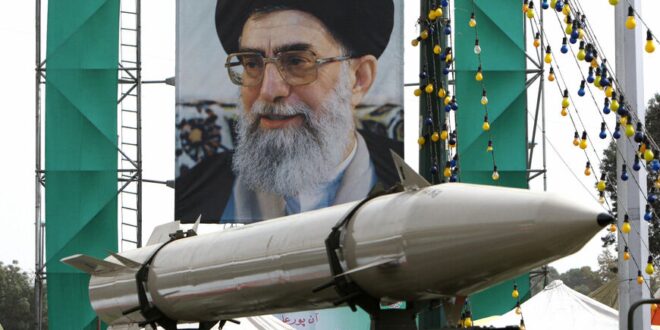The Islamic Republic appears uninterested in a direct confrontation with Israel amid the latter’s war with Tehran-backed militants in Gaza, but has warned that its proxies remain ready to pull the trigger and “re-map” Israel.
Since the outbreak of the war between Israel and Gaza militants, Iran — as a major regional player and a key ally of the Hamas movement — has been pursuing an active diplomatic campaign to isolate Israel. At the same time, it has attempted to project disinterest in a spillover of the conflict.
How will the Islamic Republic react, however, if its sworn enemy goes ahead with its promised ground offensive into the besieged Gaza Strip?
Support for the Palestinian cause has been an ideological principle of Iran’s Shiite theocracy since its inception, following the 1979 revolution. Shunning international pressure, Iran has over the past four decades nurtured, funded, armed and expanded a network of proxies around the Middle East to “export the revolution” and cement regional influence, a policy viewed by its Western adversaries as “adventurism” and sponsorship of terror.
The Palestinian cause, a pillar of the republic’s establishment
“The path to al-Quds [Jerusalem] passes through Karbala” is a telling motto in the Islamic Republic’s rhetoric, bolstering Tehran’s efforts — from Iraq, Syria and Yemen to Lebanon and the occupied territories — to indirectly fight Israel and target US interests.
In the wake of the ongoing Israeli airstrikes on Gaza triggered by the surprise Hamas onslaught on southern Israeli communities on Oct. 7, Iran has now warned that a regional conflict could be just around the corner.
“No one will be able to stop the forces of resistance if the Zionist regime refuses to halt its attacks,” said Ayatollah Ali Khamenei, Iran’s supreme leader, in a speech on Tuesday. The cleric, who calls the shots in Iran’s foreign policy and military affairs, was referring to Hezbollah in Lebanon, the Houthis in Yemen and the Popular Mobilization Units in Iraq, among other Shiite militia groups, hailed by Iran as the “axis of resistance.”
With Hezbollah’s missile capabilities believed to have been significantly bolstered by Tehran in recent years, the Lebanese militia currently poses the biggest threat to Israel. Following a meeting last week with the group’s leader, Hassan Nasrallah, Iranian Foreign Minister Hossein Amir-Abdollahian spoke with particular confidence in an interview on state TV.
“I was told assertively by the resistance forces that they are prepared for any direct confrontation with the Zionist regime,” Amir-Abdollahian said. According to him, should Israel go ahead with its planned Gaza offensive, it would prompt Iran-backed proxies to action and eventually lead to Israel being “re-mapped,” ceding territory.
Keeping the enemy at bay through battles beyond Iran’s borders has been a crucial doctrine in Tehran’s security and foreign policy agenda, promoted and pursued in particular by Qasem Soleimani, head of the Quds Forces, a branch of the Islamic Revolutionary Guard Corps (IRGC), who was killed in a US airstrike in early 2020.
Locating that policy within the context of the ongoing war, the Iranian foreign minister said, “If we fail to defend Gaza today, we will then have to face bombs being dropped on children’s hospitals in our own towns.”
A ‘three-front battle’ and the oil card
Iranian state TV, whose coverage of sensitive military developments falls editorially under the authority of the IRGC, ran a report on Wednesday, outlining in detail how Iranian proxies could swarm Israel from three different directions.
According to that scenario, Hezbollah from the north, Yemen’s Houthis from the south and militias based in Iraq and Syria from the east could shower Israel with barrages of Iran-made missiles and rockets. “The trigger could be pulled in the coming days,” the report said.
Nonetheless, a review of Iranian officials’ public statements suggest their own meticulous choice of words. They continue to speak of “independent resistance groups” and avoid any talk of a direct Iranian confrontation with Israel, which at least on paper, appears to be militarily superior.
Despite the typically incendiary anti-Israeli and anti-American rhetoric in times of regional escalations, the Iranian leadership has in most cases overcome any temptation to rush into conflict. The series of assassinations of Iranian nuclear and missile scientists and sabotage attacks on nuclear facilities attributed to Israel over the past decade never once drew Iran into military conflict with it.
Similarly and more notably, the Islamic Republic narrowly dodged a full-blown war with the United States after the killing of Soleimani, an incident that had pundits on the edge of their seats with the potential of regional conflict.
In the event of an expanded war, Iran may also be counting on a degree of support from Russia and China, key allies that have refused to publicly condemn Hamas for killing hundreds of Israeli civilians. The two have been increasingly boosting military cooperation with the Islamic Republic, including joint drills in international waters.
While refusing to directly confront Israel and the United States, Tehran has long threatened to use the oil card in the Persian Gulf, where the IRGC has been flexing its muscles by seizing international vessels and threatening US naval forces.
Amid the Israel-Hamas escalation, Iranian hardliners are once again renewing the threat, suggesting the closure of the Strait of Hormuz, the world’s most important and strategic route for crude oil transport and vital to international trade.
Iran is looking to push its agenda and gain the upper hand in any regional conflict with Israel by taking advantage of its proximity to the strait. Officials believe that any closure of the critical waterway — sending oil prices skyrocketing and jitters through global markets — could tremendously affect the endgame.
 Eurasia Press & News
Eurasia Press & News



